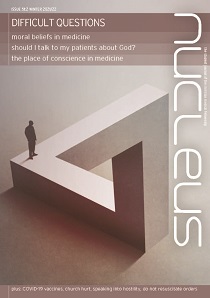Medical history-taking is an intrusive business. Alongside finding out about patients' current symptoms, history of illness and medication profile, we ask about their bowel habits, menstrual cycles and alcohol intake. Not to mention those times when we need a detailed sexual history or a comprehensive account of their recent suicide attempt. We ask a lot of questions and do so for the patient's own good. However, is there another question we should be asking? Should we ask them what they believe about God?
Perhaps even the suggestion of this makes you feel nervous. It may raise several questions for you, eg, is it an abuse of power to witness to patients? Will patients complain about me? Will I lose my job or registration? And do spiritual matters even have any relevance to a patient's health?
Whilst these questions are understandable, I believe there are many compelling reasons why spiritual care is an important part of whole-person medicine.called to be a witness
Christ's parting words to his disciples are a call to spread the good news: 'Therefore go and make disciples of all nations' and 'you will be my witnesses in Jerusalem and in all Judea and Samaria, and to the ends of the earth.' (Matthew 28:19, Acts 1:8). This is not a calling for just some Christians, perhaps only those who work in full-time Christian ministry or show gifting in evangelism. Nor is it a command which only applies to certain situations, such as during CU outreach events or summer mission trips, but not during the 9-5 of university or working life. All Christians are called to spread the sweet aroma of Christ wherever they go. [1]your patients need Jesus
Practising medicine is a high calling and a wonderful privilege but do not lose sight of the fact that every patient you treat needs Jesus more than they need good health. Furthermore, most non-Christians do not walk into a church building or attend outreach events, they are unlikely to pick up a Bible and read it of their own accord, but they do all need healthcare at some point in their lives, and this may be one of the few opportunities they have to encounter a Christian. Of course, they still need high quality healthcare from a well-trained professional, so spiritual care is not a substitute for good medicine, but it can and often should be a part of it.the gospel is good for your health
Human beings are complex creatures, composed of mind, body and soul, all of which impact each other. It is a well-established fact that your physical and mental health are linked; for instance, chronic illness increases your risk of depression and conversely depression weakens your immune system. Furthermore, living with a severe mental illness increases your risk of cancer, diabetes and heart disease. [2] Likewise, evidence from over 1,200 studies and 400 reviews has shown an association between spiritual beliefs and practices and greater protection from illness, improved coping when unwell and faster recovery. [3] Religious practices such as attending church and praying are associated with better health outcomes in heart disease, cerebrovascular disease, cancer and pain, as well as lower rates of depression, [4] anxiety, psychosis and suicidality. [5] Therefore, a patient's spiritual beliefs are relevant to their health and an important part of holistic care.you are allowed to talk respectfully about spiritual beliefs
It is a common misconception that healthcare professionals are prohibited from talking to patients about spiritual matters, but this simply isn't true. In Good Medical Practice, the General Medical Council (GMC) advises that when assessing patients, you must take account of spiritual factors as part of their history. [6] The GMC expands on this in guidance entitled Personal beliefs and Medical Practice: In assessing a patient's conditions and taking a history, you should take account of spiritual, religious, social and cultural factors, as well as their clinical history and symptoms (see Good Medical Practice paragraph 15a). It may therefore be appropriate to ask a patient about their personal beliefs. However, you must not put pressure on a patient to discuss or justify their beliefs, or the absence of them. [7]Therefore, clearly the GMC permits, and even encourages doctors to ask patients about their spiritual beliefs providing they do so with gentleness and respect. If a patient chooses to share their personal beliefs, it is of course imperative that you treat them fairly and provide an equal standard of care to all. However, are you allowed to tell patients what you believe? The GMC stipulates that you may talk to patients about your own personal beliefs, including spiritual beliefs, if you follow the following guidelines:
- Do not express your beliefs to patients 'in ways that exploit their vulnerability or are likely to cause them distress', [8] such as by trying to impose your beliefs on them or expressing them insensitively [9]
- Only share your beliefs if the patient welcomes this or asks about them and 'be very careful not to breach the professional boundary that is between you' [10]
Similarly, the Royal College of Nursing (RCN) provides guidance on spiritual care for nurses and midwives. They acknowledge that in times of crisis, such as during illness, spiritual concerns often rise to the forefront in a person's mind. Therefore, they advise that nurses and midwives assess whether a patient has any spiritual concerns and take steps to attend to these needs, involving others when required. They explain that spirituality goes beyond religious beliefs and practices to include beliefs about meaning, purpose, self-worth and hope. Therefore, any patient may have spiritual needs or concerns regardless of their faith background or lack thereof. [11]
so how do you witness to patients in practice?
This question can't be answered fully in this article, so I advise you attend a Saline Solution course to explore this more fully, but let me present four tips.1. pray for opportunities and take them when they arise
Opportunities come when you least expect it. I remember during my FY1 year I was asked to review an elderly lady in the middle of a busy night shift. After examining her and concluding she didn't need any treatment overnight, I just wanted to write up my notes and move on to the next person on my list. However she seemed quite despondent and mentioned not understanding why she had outlived all her friends. Without much thought I simply replied, 'maybe God hasn't finished with you yet', which prompted her to ask me about my beliefs and we had a very unexpected spiritual conversation at four am.2. take a 'spiritual history' by asking something simple like 'do you have a faith that helps you at a time like this?' or 'have you any spiritual beliefs that are important to you?'
Sometimes this opens unexpected conversations or patients start spiritual conversations with you at a later point, at other times people just say 'no' and clearly don't want to discuss it further, so you simply move on. Whilst I initially felt nervous asking this, I now ask every new patient/client about spiritual beliefs, and I have never once had anyone object or seem offended by this question.3. make time to talk to your patients and get to know them as people
Clinical work is busy and once you start work you will probably never feel like you have enough time to do it all. However, it is possible to find a couple of extra minutes to show an interest in patients' lives, and this mainly comes down to attitude and effort rather than workload. The chances are that if you only know your patients by their diagnosis and bed number and don't see a problem with this, then you are much less likely to have meaningful conversations with them about God. So when you are inserting a cannula in someone's arm or reviewing them on the ward round, ask them how they are coping with being in hospital or what they used to work at and give them an opportunity to get to know you a little bit as well. Lying in hospital all day is boring and lonely, so don't underestimate how responsive patients can be to someone simply showing an interest.4. wave some faith flags
Faith flags simply identify you as a Christian. They are brief, occur naturally in conversation and don't demand a response but can create opportunities to talk to patients who wish to do so. Some examples include wearing a CMF lanyard or dropping the word 'church' into conversation (eg, 'you are from _______, I go to church near there' or 'My friend from church is a teacher too, that must be a really busy job', etc). Your goal is just to identify yourself as a Christian and show you are happy to talk about your faith.Likewise, your goal in all the above interactions is simply to sow some seeds, even if just a few grains. You don't need to launch into a gospel presentation or a three-point sermon. Just pray for God to use you, look out for those whom the Holy Spirit has been preparing, sow some seeds when opportunities arise, and trust that God will bring the harvest.
Ashley Stewart is CMF Associate Head of Student Ministries
































